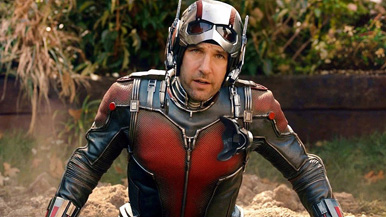The Number One Movie in America: Ant-Man
By Sean Collier
August 10, 2019
Is Ant-Man the MCU’s least successful superhero?
Not in narrative terms, of course. That title remains Hawkeye’s to lose.
In terms of box office, no MCU project has added up to less than the solo adventures of Ant-Man. The two standalone films starring Paul Rudd as the diminutive (and occasionally gargantuan) hero rank 18th (“Ant-Man and the Wasp”) and 21st (“Ant-Man”) among the 23 films in the series to date. The first film pulled in $180.2 million at the domestic box office; its sequel made $216.6 million.
As an admittedly absurd point of comparison: “Avengers: Endgame” beat the theatrical total of “Ant-Man” in about 32 hours.
Scott Lang and Hope Van Dyne’s company at the bottom of the MCU chart are properties that started slow but have since been rehabilitated. “Thor” and its first sequel weren’t particularly popular, but the character was revitalized through the core Avengers movies, turning “Thor: Ragnarok” into a much more sizable hit. Early MCU gem “Captain America: The First Avenger” didn’t command the box office of “Iron Man,” but all of its sequels were big hits. The franchise’s permanent basement dweller, “The Incredible Hulk,” was assuredly a bust, but the franchise has successfully refocused the character as a side dish rather than a main course.
Ant-Man, however, seems to remain on the series’ fringes, even after playing a pivotal role in “Endgame.” His character was introduced at a point of relatively low hype for the series; the preceding entry, “Avengers: Age of Ultron,” made a boatload of money but is regarded by many as one of the low points in the MCU. “Ant-Man and the Wasp” received a bump from the wake of “Infinity War” — and, I would argue, by including longtime comic-book favorite Wasp in the title — but stands as the least-profitable film of Phase 3.
Even in “Endgame,” Scott Lang serves as more of a plot device than a central figure. This is the series that turned Groot and Loki into cultural icons; why can’t Ant-Man get paid?
On the one hand, “Ant-Man” is a fine and entertaining chapter in the story. It’s often funny, it has a great cast — Evangeline Lilly and Michael Douglas are perfect, and the supporting turns from Michael Peña and T.I. are essential — and its effects are impressive. The film leaves out the bad origin-story tropes (yes, Lang has a troubled backstory, but we’re not gonna dwell on it all day) and keeps the good ones (man, does this movie have some great montages).
On the other, many of the problems Marvel was working through at the time are evident. “Ant-Man” has the least interesting villain in an era where the studio had considerable trouble with antagonists; Corey Stoll is left to do little bit seethe and glower with the forgettable Yellowjacket. It’s undoubtedly too long, with a rambling conclusion that could’ve used a lot less meat. And the tone is much lose consistent than it would be in “Ant-Man and the Wasp,” most likely due to the midstream ejection of Edgar Wright as the film’s director.
In short: Ant-Man was introduced with a pleasant but flawed movie that came out during a rare Marvel rough patch. He got a (better) sequel, but the die was cast: This guy is not one of the can’t-miss Avengers.
Is it a shame? Maybe. But am I sad that we’ll get more of Black Panther and Captain Marvel (and new additions to the roster) instead of another Ant-Man vehicle? Not at all.
“Ant-Man” is the subject of the latest episode of The Number One Movie in America, a look back at past box-office champions. Each episode’s film is drawn at random from a list of every number-one movie since 1982. Please listen and subscribe!
Next time: How many A-list stars does it take to turn a half-century-old heist picture into a massive franchise? About 11.




